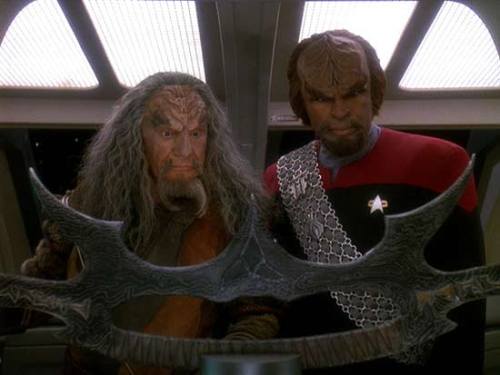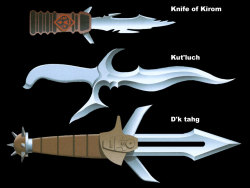The first thing is that Klingonists (and if you're studying the Klingon language, that makes you a Klingonist, too) like to share their anecdotes and stories, and to practice The Warrior's Tongue, both online and in person.
The next post will describe the main groups and, of course, the KLI (Klingon Language Institute), but this post is for the face-to-face meetings.
The Klingon word qep (TKD) means meeting (n), and this is the term used by Klingonists for the two annual major Klingonist conventions - the qep'a'mey and qepHommey.
The KLI has held qep'a'mey for 26 years - the latest, qep'a' cha'maH javDIch, was held in Indianapolis, IN, USA.
There is also a European qepHom - the latest, qepHom wa'maH chorghDIch, is set for November 14 - 17, 2019, and it takes place in Saarbrücken, Germany.
qepHom main page
What Goes On During A qep'a' / qepHom?
Here's the listing of events from the 2019 qep'a' to give you a taster of the sorts of activities which take place at these gatherings.
Thursday, July 18
8am betleH wIqeq betleH warmups on the hotel lawn
10am ghojmeH pa ‘ : QIch Review pronunciation and other basics
10am qeqmeH pa ‘ : meH beq Help fly a captured Human vessel with a Klingon crew
12pm megh Lunch
2pm mabom ‘ej matagh Opening ceremonies
2:30pm ‘Iv jIH Guess your hidden identity
4:00pm qeqmeH pa’: tlhIngan Hol Qoyje’ qaD Testing for KLCP
4:00pm mu’qaD veS yIQ Curse Warfare in the pool
6:30pm ‘uQ Meet in the lobby for carpooling to dinner
8:30pm qeqmeH pa’: tlhIngan ram nI’ bom A recorded video of A Klingon Christmas Carol
Friday, July 19
8am betleH wIqeq betleH warmups on the hotel lawn
10am ghojmeH pa’: Qoy Practice speaking and hearing Klingon
10am qeqmeH pa’: veqlargh Sam A social game where you have to find the Fek’lhr hiding among you
12pm megh Lunch
2pm qeqmeH pa’: tlhIngan Hol Qoyje’ qaD Testing for KLCP
2pm wa’ ‘ay’ Change a familiar sentence one bit at a time to make a new sentence
3:30pm qaDHom wa’ Trial One: give a short speech based on a prompting word
6:30pm ‘uQ Meet in the lobby for carpooling to dinner
Quj latlh je Games etc.
Saturday, July 20
8am betleH wIqeq betleH warmups on the hotel lawn
10am ghojmeH pa’: Qur Focus on the grammar basics
10am qeqmeH pa’: tlhIngan Hol jem Total Physical Response – get your hands on the language
11am Lobby: tlhIngan Hol Qoyje’ qaD Testing for KLCP
12pm megh Lunch
2pm qaDHom cha’ Trial Two: create a short story based on a randomly selected phrase
4:30pm Hol lut Marc Okrand talks about the creation and maintenance of the Klingon language
5:30pm yejHaD Dotlh State of the KLI
6:15pm mIllogh qonlu’ Put on your Klingon regalia (or a T-shirt) and meet for the official qep’a’ photo
6:30pm pItSa chab Pizza Party
7pm muchHommey Sar The qep’a’ Cabaret
Deghlu’meH QaQ jajvam Open activities after Cabaret



